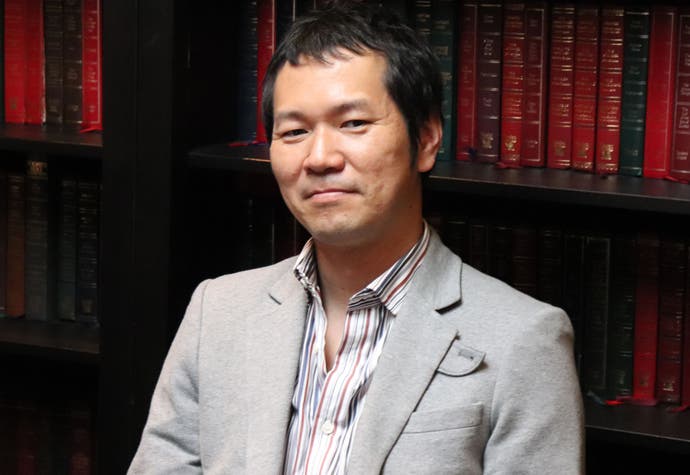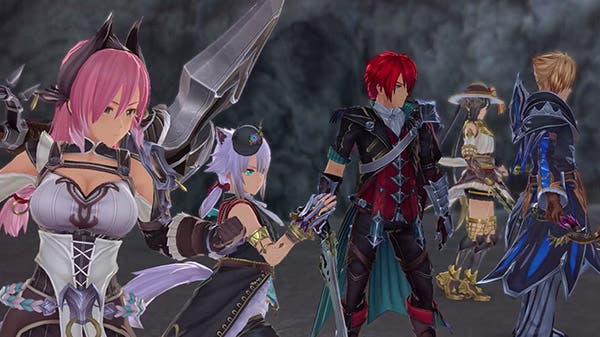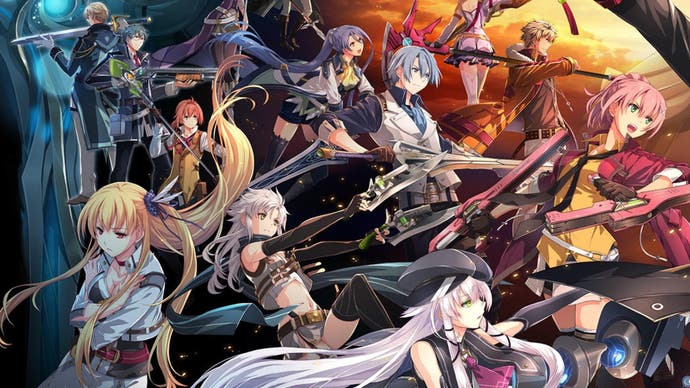The fan who took the reins at a JRPG powerhouse
Celebrating 40 years of Falcom.
There are beloved boutique Japanese studios, and then there's Falcom; a true grandee about to celebrate its 40th anniversary, the company traces its beginnings back to a hobbyist shop selling PCs and Apple IIIs as well as the curious games people were coding for them, before turning to making those games themselves. The studio has stayed purposefully modest ever since, still employing just over 60 people as it continues doing what it does best: making RPGs rich in character and story, with vast arcs that can span multiple games.
Fans of Falcom are a dedicated bunch, then - like Toshihiro Kondo, for example, who took over the reins from founder Masayuki Kato in 2007. Since then, there's been a gentle push towards the west that's led to new audiences discovering the likes of Ys, the brilliantly breezy action RPG, and the ongoing Legend of Heroes series and its offshoots - a series that rivals the likes of Dragon Quest and Final Fantasy in longevity.
As Falcom's 40th anniversary beckons, we sat down with Mr. Kondo to discover how he went from being a superfan to heading up the company - and how Falcom are endeavouring to find new fans along the way.
Tell me about your first interaction with Falcom's games - how did you come to them yourself?
Toshihiro Kondo: When I was a university student - I was just a normal, game loving student - I encountered a game called The Legend of Heroes 3: White Witch [translated for its Western release as Prophecy of the Moonlight Witch]. It was the first time I'd experienced that you could have a story, you could have a world and you could have something so compelling and moving in the form of a video game. Before that I was aware of the company itself, but mostly through my friends who are also gamers. I thought okay, when it comes time for me to apply for a job, I'm going to apply to them.
What was it about Falcom's games that made them stand out against their contemporaries?
Toshihiro Kondo: This was a PC game, and one thing I really appreciated was that, although it was an RPG, all of the townsfolk had their own names. It wasn't just townsperson A, B, or C, or just 'woman' or 'man'. They each had their own name, and each person had their own individual lines. Not only were their lines different from one another, as the story would progress, and as you'd hit different points to progress the story, you can return to these towns and speak to these people and their conversation would be completely different. They would be talking about things that either would be related to the story or would advance their own stories, so it felt like these characters have their own lives. It really helped create a sense of the world and a sense of consistency, and added to the scale of it all. I'd never seen anything like that before.
Before you joined Falcom itself, I believe you made your own fan magazines. Could you enlighten me on how your fandom manifested itself before you joined the company?
Toshihiro Kondo: It's actually a pretty interesting story. This entire fan website thing came about from a university project. I was taking a seminar in school, and one of the assignments was to create your own homepage - it was just a basic website. This was the time on the internet when there were maybe two browsers max - it was really early on, particularly in Japan. This was the time period before people learned you could use the internet for evil! People would gladly post a picture of themselves, they would write their full names, they'd write their address!
This class was more to become familiar with the internet, but I felt that this was an incredibly boring thing to do, and I didn't want to do what everybody else was doing. It was right at the time when I was super into The Legend of Heroes 3: Prophecy of the Moonlight Witch. So I thought, why don't I make a guide to this game?

So I created this guide, and posted it online. Now the thing was, I went to a private university, but the server that was being used was a shared server between the public university and the private university. The guide actually ended up becoming the number one searched site on the server, which became something of a problem!
On the other hand, after I posted the site and it gained some notoriety, I began to think of the legality of what I was doing. I realised this is copyrighted material, and wondered whether it's okay that I post all this information freely online. And so that's when I began an email conversation with Falcom, and when I also began to think of them as a place that perhaps I could apply to for work.
I sent this email, essentially asking if what I'm doing is okay. The answer I received, though, was really vague. It was basically, 'we're gonna leave it up to you to not create something that would be problematic or wrong.'
From there, I got another email about a poll on the site, and I actually received feedback from them offering advice as to how I can operate the site. The response I sent in reply was noticed by the founder, Mr. Kato. He was apparently very impressed with the way the mail was composed - it didn't feel like it was composed by this young university student, and rather it was like someone who was really in control of themselves. From there, they said, why don't you come down to the office and meet everybody?
What was the company you walked into like back then? What was the experience like of being a fan and walking into the studio?
Toshihiro Kondo: So this is slightly different than the question you're asking - but I think you'll find this interesting! At first I was really nervous because the email was a little bit vague. It was just 'come to the company', and I didn't know what exactly that entailed. So I showed up, and I met with the founder. Essentially, the conversation quickly turns into 'are you interested in working here?'
At the time, video games weren't necessarily seen as the most wholesome use of one's time. And so Mr. Kato says if you do want to work here, you're going to have to find a way to convince your parents. So he called in two people - in the Japanese system, these two people would become my seniors within the company. And he says, here's two young guys around your age, they'll be able to give you some advice on what to say to your parents. I don't remember what that advice was, but one of the people was the now famous director of anime Your Name Shinkai Makoto.
One of the special things about Falcom, then and to this day - when I entered the company, and when Shinkai Makoto came into the company, neither of us had any real skills. Neither of us were script writers, neither of us were movie makers, neither of us were composers - we didn't have what you'd think would be immediately translatable skills for the company. But the company was able to see the ability within us and other employees, and foster that ability and allow it to grow.
So for example, in my case it was scriptwriting, and so they pushed me in that direction. On the opposite side, Shinkai Makoto had skill when it came to movie creation, as it were. He entered the company without any skills in that area, and they fostered that for him and allowed him to do that. The only real rule was - you can do anything, just make sure you do it. You know, that creates an atmosphere and environment for people to really spread their wings and fly.
Was it intimidating being there as a fan?
Toshihiro Kondo: Absolutely, I was scared of everything! I was surrounded by all these very talented people who could do lots of things and I didn't know what I was capable of at the time. Probably for that whole first week my stomach really hurt.
So how do you go from joining as a fan to becoming president of the company?
Toshihiro Kondo: For the very first year, I actually didn't have anything to do with game development - I worked on servers and things like that. From there, what happened was because I was such a big fan of Legend of Heroes 3 - the original game was on a PC98, which is like a hobbyist computer, and they wanted to make a Windows version. To make this Windows version, they decided to add a new scenario element, and the writing of it was left to me.

From there, that allowed me to dip my feet into the game development side of things, and then I was able to interact more closely with the development staff, which led to me working on project management, and then being able to work on project management allowed me to make suggestions that would directly impact the way the games were developed. And then because I had more experience, I was able to grow further and work with more positions of responsibility.
One of the other things was obviously I was one of the originators of Trails in the Sky. Working on these allowed me to be able to look at development as a larger process, and to be able to be involved with it at a granular level. As I continued to work, there would be projects that might not necessarily have been doing very well, and so the company saw that they were able to place me in a position of leadership and management over these projects to get them back on track.
Eventually I became the head of development overall. And then they created a special division within the company that dealt with development and things like this. And I was actually put at the top of that as well. At this time, the president of the company unfortunately fell ill, so they needed to find someone else who could take over this role. When they were looking for his successor, the qualities that we're looking for was obviously someone who understood development very clearly and very well. But another thing also was that someone who understands other aspects of business appeal, including marketing and things like that, because I had experience and knowledge to some degree in those areas as well. I kind of became a natural fit. This was in the ninth year of employment I became an executive.
How much has the studio changed over those years, and how have you kept true to the identity of the studio as well?
Toshihiro Kondo: Probably the largest thing that changed would be the transition from making PC games to making what we call in Japan consumer hardware - consoles. When I joined, you know, that was the bread and butter and essentially the only thing we developed. But gradually, as that market began to diminish, stores in Japan stopped carrying the packaged versions of these games. Right around the time that I became president, the company made the overall decision to shift from being a PC development house to console.
PC game development at the time was made for a very specific audience - what I would call the hardcore, or the maniacs. And these were people who didn't really care about a lot of things other than the actual contents of the game itself. When we switched gears to making games for consumer hardware on console, the idea was you have to be much more broad.
The way we decided to approach that was thinking about the story, the characters, the scenarios. How can we make these as broad as possible? This is in great contrast to when I joined the company - back then I was writing plans for really cool characters and ideas for that aspect, and my seniors in the company would get upset, saying 'this doesn't matter - what matters is the gameplay, this is all irrelevant!' That obviously changed quite drastically when you switch development to console.
What's the identity of the company that you've strived to stay true to?
Toshihiro Kondo: That's a really difficult question! Even if you were to ask Mr. Kato, the founder, what's our philosophy, probably even he couldn't answer that. There's nothing that's necessarily been passed down from previous people in the company to be able to answer this question.
For myself, what the company's identity is, and what it means, is that I feel each and every person in the company is a craftsperson - a craftsperson focused on the craft of making video games. Within the lifespan of the company, there were decisions made in terms of how to grow the company, particularly in regards to adding personnel and staff. Mr. Kato made a deliberate choice to ensure that people who entered the company shared this value of wanting to make video games.
Partially, it was a practical thing - how can you make video games efficiently? How can we have communication with one another, and make sure we're all on the same page so we can do what we do efficiently? It might have been to the detriment of growth, and might have been to the detriment of other things. But that's the types of people who came into the company. I believe, for better or for worse, that's what allowed us to be who we are.
An example of this is the fact NIS America publish our games in the west - honestly speaking, we should be the ones publishing our games! We leave that up to partners and we work with them in order to get our games published - and what that does is it allows us to do what we do best, which is focus on making games.

In recent years your relationship with the West seems to have strengthened - obviously just by virtue of talking to me, which is really appreciated, that seems to be the case. Now you're able to speak to Western fans more, how has that impacted the studio and changed its identity?
Toshihiro Kondo: Over these last few years, we've been able to have more of a direct contact with both fans and media in the West, which has been a great boon to us. Even a situation like this is something that really would not have happened before.
As Asian people, the games that they're going to naturally cater to Asian taste - I don't necessarily think it would be a good thing to wholesale change that, or to try to make something that would specifically appeal to Western taste.
(Ys 9 caption - the more open world elements are in part inspired by Kondo's conversations upon his last visit to the west with fans and media)
Our time's coming to an end, so I just wanted to wrap up by asking what the next 40 years of Falcom holds - and also I wonder if there's any fans within the company much like you were back in 1998 who you see as the future of the company?
Toshihiro Kondo: The people who entered this company - myself included, and including people to this day - are people who were fans of the company. They saw value in what was created, and they wanted to, in their own way, contribute to those games and those ideas, as well as to further them.
One of the things that the company has struggled with to a degree is that most people who pick up a Falcom game, when they play it, they like, they enjoy it and they appreciate it. The issue is getting people to that first step. As a company, we don't make games that are flashy or eye-catching or grab people right off the bat. So how can we, while maintaining the core of what makes our games special, improve upon those areas and get people more interested in our games.
To elaborate a bit more on the second part of your question - absolutely, you know, those staff members exist in the company. Now again, these are people who joined the company because they love the games that were made. Looking at myself, I loved Legend of Heroes : White Witch, while the people who are joining the company today are people who love the Trails series, and who love games like Ys 9.
The thing that connects everybody generationally in the company are the games and what they meant to each person who joins. It's this idea of how can we get more people on board and involved in this. I'm absolutely sure that the generation who's entering the company now are the same calibre as myself, and the people who came before. People who love these games and want to continue this legacy.


